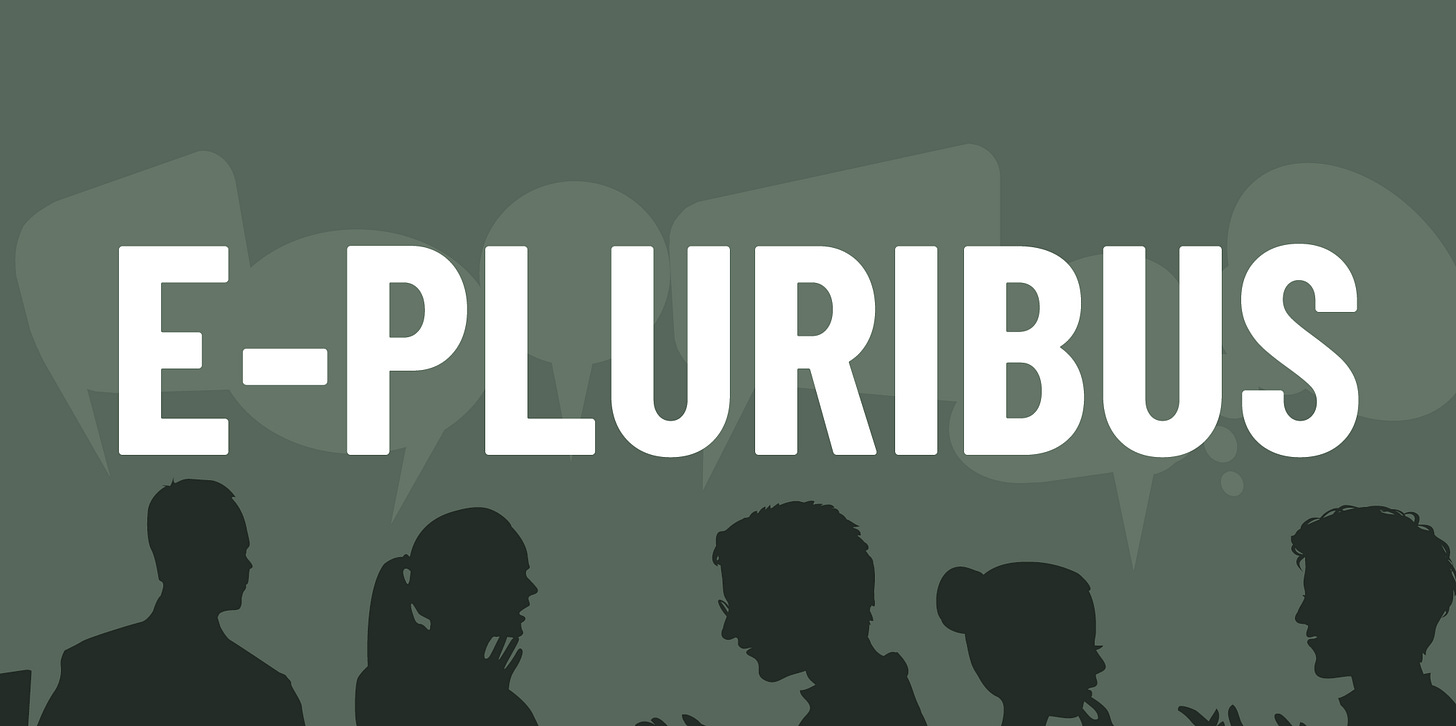E-Pluribus | March 31, 2023
Disinformation! In other words, shut up; we lose when we won't listen; and Massachusetts tries to make snitching respectable.
A round-up of the latest and best writing and musings on the rise of illiberalism in the public discourse:
Martin Gurri: Disinformation Is the Word I Use When I Want You To Shut Up
If certain words are meant to open or encourage conversations, Martin Gurri at Discourse Magazine argues that “disinformation” is the opposite. Gurri writes that the disinformation police have even gotten to the stage where a denial that one is spreading disinformation simply confirms guilt.
The federal government’s quarrel with disinformation was laundered through outfits like Stanford Internet Observatory, Global Disinformation Index and the Aspen Institute. These places found the situation to be much worse than anyone had thought. More money was obviously needed. Here is Renee DiResta of Stanford Internet Observatory, loudest voice on the subject from the penumbral NGO world, sounding the alarm: “Over the past decade, disinformation, misinformation, and social media hoaxes have evolved from a nuisance into high-stakes information war.”
[ . . . ]
By now the exasperated reader may be ready to cry out: Why such a fuss about disinformation, whether for or against? That would be an unwise move. To ask about disinformation is disinformation. And if you deny the power of disinformation, that’s disinformation to the 10th degree. It means that you’re a tool of Vladimir Putin and—to reference the crazy general in Doctor Strangelove—a polluter of our precious bodily fluids.
The people who run our institutions need the word like a double shot of Xanax, just to make it through the night. They believe many impossible things. They believe that men can become pregnant and present-day America is the second coming of Hitler’s Germany. They believe that Biden’s economic policy has been a wild success and that his foreign policy has made us all safer. Disagree if you dare. They have no arguments—they stopped thinking a long time ago. At some level, they probably know that they have drifted into a fantasy world. But there’s nothing more reckless than the hysteria of the powerful, and if you pierce their delusions you will be exposed to the fear and loathing of elite princelings who, with a wave of the hand, can hire and fire, lend and withhold, regulate and prosecute.
Read it all.
Pamela Paul: The Most Profound Loss on Campus Isn’t Free Speech. It’s Listening.
Chalk up another in the “yes” column for the campus free speech question, Is the juice worth the squeeze? Pamela Paul writes in her New York Times newsletter that listening is a vital part of the “squeeze,” and if students are taught they can simply drown out that which they assume they will disagree with, colleges and universities are doing them a huge disservice.
Many valid points have been made about the federal appeals court judge Kyle Duncan’s speaking engagement earlier this month at Stanford Law School, which was repeatedly interrupted by protesters. Advocates of free speech denounced the hecklers’ refusal to let Duncan deliver his remarks. Defenders of the students justified their own right to speak. Duncan and others lamented the tenor of the protests and the response from an administrator who failed to quell the vitriol and asked, “Is the juice worth the squeeze?”
The administrator was asking, essentially: Is it worth letting someone speak if some students consider that person’s views objectionable, even abhorrent? But another question to ask is: What gets lost if we don’t let that person speak?
For one thing, the Federalist Society members who invited Duncan, a Trump appointee, missed hearing from a like-minded judge. Duncan, who says he speaks at law schools in part so he can hear from students, lost out as well.
But the protesters themselves suffered the greatest loss. Unleashing on Duncan may have felt good in the way we Brown students felt good asking our “tough” questions of Scalia. But whereas we got to hear the answers, the Stanford Law School students did not. It isn’t enough to challenge someone unless you’re willing to be challenged back. Scalia’s answers may not have made us feel especially good, emotionally or intellectually. They did, however, teach us the value of listening and motivate us to be smarter.
Read the whole thing.
Fred Bauer: State-Sponsored Tattletales
George Orwell’s 1984 has the thought police, and now at least some Massachusetts public schools have their “bias incident reports.” At City Journal, Fred Bauer reports that the state is even reaching beyond school property to keep tabs on students, saying that “social media, texting or other online activity may qualify as in-school incidents.”
A phenomenon is sweeping many Massachusetts public schools: the “bias incident report.” The inner-ring Boston suburb of Newton (home of Jake Auchincloss, the congressman for the Fourth District) hosts an online portal where a person can report any cases of “hate speech, bias, or discrimination.” Another wealthy suburban district, Acton-Boxborough, lays out a protocol for the reporting and investigation of “all incidents of bias, including prejudice, bigotry, microaggressions and cultural appropriation.” Belmont, Lexington, and Wellesley are among other elite suburbs with these kinds of protocols, though their emergence is not confined to wealthy districts: Boston Public Schools has its own “equity” reporting form.
[ . . . ]
[Massachusetts Attorney General Maura] Healey’s directive thus creates an incentive for public schools to take extraordinary measures to confront alleged bias incidents. Further, the guidance says that schools have a responsibility for policing bias even in incidents that happen after the school day or off school property. Even “social media, texting or other online activity may qualify as in-school incidents” because of the “pervasive presence in students’ lives” of such digital communication. While the memo nods in the direction of some First Amendment protections for speech, it argues that “schools may discipline students for protected speech that causes, or is likely to cause, a substantial disruption or interferes with the rights of others.”
[ . . . ]
The implications for pluralism are obvious. Would a school, for instance, take the side of a student who found that an “offensive” environment was created by instruction in critical race theory? Questions of privacy are perhaps more profound. These protocols take the idea of “see something, say something” away from issues of public safety (such as a gun in a school) to more amorphous territory, mediating all personal relationships through a bureaucratic apparatus. Most Americans would agree that school officials should know if one student physically attacks another. But what counts as “imitating someone’s cultural norms” is less clear, and cultural imitation is often an important element of cultural exchange and innovation. In a time of growing public concern about American teens’ emotional state, an educational regime of mass peer surveillance and reporting could compound feelings of isolation and mistrust. Calling on students to report on one another for crossing various cultural bounds could encourage not intermixing and integration but the retreat to cultural bunkers.
Read it all here.
Around Twitter
The Foundation for Individual Rights & Expression with some troubling aspects of Twitter in the era of Elon Musk (click for full thread):
Via Wesley Yang, some fascinating insights into “wokeness” from a DEI administrator at a community college in California:
And finally, a clip of a Bari Weiss interview with record producer Rick Rubin and changing lyrics:











